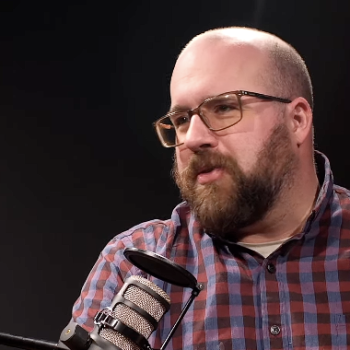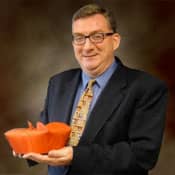It was the "Golden Age of Television," and one of its shining stars was a Catholic bishop. In 1952, Fulton Sheen was placed in the same time slot as Milton Berle. Few expected him to last alongside "Mr. Television." But over the next five years, "Life is Worth Living" won every major award and commanded an audience of thirty million. (Accepting an Emmy, Sheen thanked his writers Matthew, Mark, Luke, and John.) One critic called him the most influential Catholic bishop since before the Reformation.
For twenty years prior, Sheen had been a prominent radio personality, hosting "The Catholic Hour." In his autobiography, Treasure in Clay, he wrote of his media career:
I was born in the electronic age . . . Radio is like the Old Testament, for it is the hearing of the Word without the seeing. Television is like the New Testament, for the Word is seen as it becomes flesh and dwells among us.
Growing up on an Illinois farm, a neighbor had told his father: "Newt, that oldest boy of yours, Fulton, will never be worth a damn. He's always got his nose in a book." Born May 8th, 1895, he was named Peter but called Fulton (his mother's maiden name) throughout his life. From childhood, he knew two things: he hated farm life and he wanted to be a priest.
At St. Viator College in Bourbonnais, he joined the debating team. At one point, his coach said, "Sheen, you're absolutely the worst speaker I ever heard. Do you know what's wrong with you?" The young man replied, "I'm not natural." Biographer Thomas Reeves notes, "It was a lesson he never forgot."
Ordained in 1919, Father Sheen pursued doctoral studies at Belgium's University of Louvain. He shone brilliantly, earning the highest honors. Back in America, he taught Philosophy at Catholic University (he turned down offers from Columbia and Oxford). For a quarter century, he taught, conducted retreats, received converts into the Church, and lectured worldwide. A student once commented, "I don't know how you do it." "Well," Sheen said with a flourish of his cape, "neither do I!"
In his academic lectures, in the pulpit, on the radio, Sheen tried to make Catholic philosophy accessible to modern audiences. He advised one interviewer: "Bring big ideas down to the level of Second Year High . . . No idea is too abstract for anyone to understand." As a professor, he aimed to "answer the errors of modern philosophy." On radio, and later on television, he tried to do the same thing.
Even before he appeared on television screens, Sheen was considered undeniably dynamic. Watching him preach at St. Patrick's Cathedral in 1940, actress Loretta Young noted: "He had tremendous acting ability and a God-given sincerity." In 1949, journalist Gladys Baker called him the "name priest in America . . . By members of all faiths, Monsignor Sheen is considered the most electric orator of our times."
In 1950, Monsignor Fulton J. Sheen was named national director of the Society for the Propagation of the Faith, a fundraising organization for the missions worldwide. There, a peer noted, he put in "ten times as much work as any businessman on Madison Avenue." Sheen loved New York. One priest friend recalled: "Mention New York and the big expressive eyes gleamed."
In 1951, Sheen was named an Auxiliary Bishop for the New York Archdiocese to help Cardinal Francis Spellman. In his memoir, Sheen admitted that he had long prayed to become a bishop. Reeves, however, notes that Sheen saw "no conflict between his personal ambition and his passion for souls." Sheen explained it away as a "holy ambition," but still it was ambition. (Lore has it that when Spellman was named Archbishop in 1939, Sheen took to bed for three days in despair.)
Perhaps the most memorable portion of Sheen's life was his television career. He appeared before his audience resplendent in cassock and cape, with silver hair and dark eyes shining on black and white screens nationwide. Charles Morris suggests that he "may have been the finest popular lecturer ever to appear on television":
He was elegant, elevated, relaxed, often very funny. Only Jack Benny could top Sheen's ability to hold back a punch line—ten seconds, sometimes even longer—gazing calmly at the camera the entire time.
"All at the same time," Morris concludes, "he managed to be religious, undogmatic, humane, and unthreatening. Week after week, the performances were simply brilliant." The show ended abruptly after he butted heads with Spellman over mission money, and Sheen lost. He continued at Propagation until 1966, when he was named Bishop of Rochester, New York at age seventy-one.
The Second Vatican Council had just ended, and Sheen sincerely tried to implement it. But this was a difficult time in the Church, and a particularly difficult time for Sheen. Critics suggested that his best days were past, that he wasn't suited to running a diocese, that he was more suited to big ideas than small details. In October 1969, he submitted his resignation. Named an honorary Archbishop, he went into semi-retirement.





